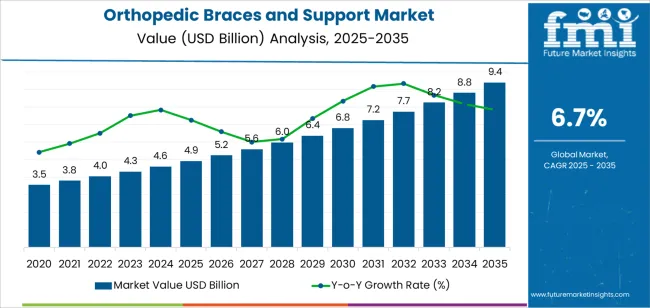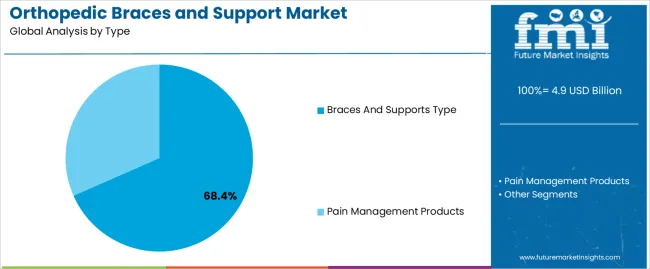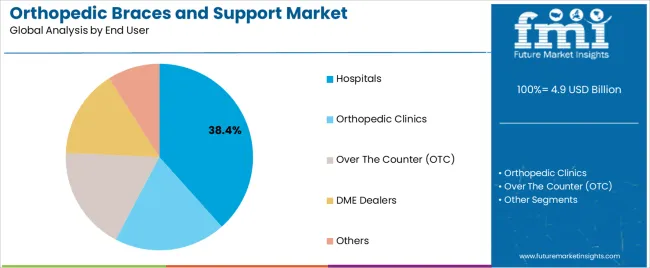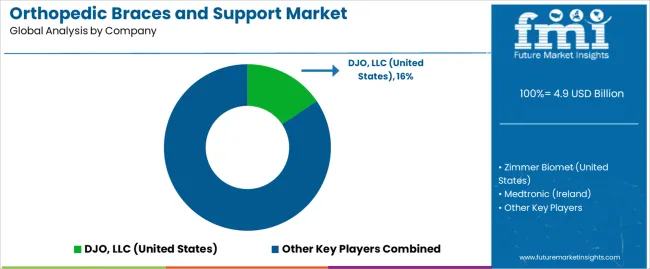Orthopedic Braces and Support Market Size and Share Forecast Outlook 2025 to 2035
The orthopedic braces and support market is experiencing sustained growth, driven by the increasing incidence of musculoskeletal disorders, sports-related injuries, and rising geriatric populations worldwide. Growing awareness of preventive orthopedic care and the use of non-invasive treatment options have further enhanced product demand. The market benefits from advancements in materials science, such as lightweight polymers and breathable fabrics, improving patient comfort and compliance.
Healthcare infrastructure expansion and a growing preference for early mobility solutions are also supporting adoption rates. Additionally, the rise in outpatient rehabilitation and home care settings is expanding the user base across regions.
With the integration of smart technologies and customizable fitting systems, manufacturers are enhancing product performance and user experience. The long-term outlook remains positive as orthopedic braces and supports continue to play a vital role in post-surgical recovery, injury prevention, and chronic condition management..
Quick Stats for Orthopedic Braces and Support Market
- Orthopedic Braces and Support Market Industry Value (2025): USD 4.9 billion
- Orthopedic Braces and Support Market Forecast Value (2035): USD 9.4 billion
- Orthopedic Braces and Support Market Forecast CAGR: 6.7%
- Leading Segment in Orthopedic Braces and Support Market in 2025: Braces And Supports Type (68.4%)
- Key Growth Region in Orthopedic Braces and Support Market: North America, Asia-Pacific, Europe
- Top Key Players in Orthopedic Braces and Support Market: DJO, LLC (United States), Zimmer Biomet (United States), Medtronic (Ireland), Stryker Corporation (United States), Össur (Iceland), NuVasive®, Inc (United States), Integra LifeSciences Corporation (United States), Globus Medical (United States), OTTOBOCK (Germany), AC Mould Engineering Limited (China), Johnson And Johnson Services, Inc (United States), Weber Orthopedic LP. DBA Hely And Webe (United States), BSN Medical (India)

| Metric |
Value |
| Orthopedic Braces and Support Market Estimated Value in (2025 E) |
USD 4.9 billion |
| Orthopedic Braces and Support Market Forecast Value in (2035 F) |
USD 9.4 billion |
| Forecast CAGR (2025 to 2035) |
6.7% |
Segmental Analysis:
The market is segmented by Type and End User and region. By Type, the market is divided into Braces And Supports Type and Pain Management Products. In terms of End User, the market is classified into Hospitals, Orthopedic Clinics, Over The Counter (OTC), DME Dealers, and Others. Regionally, the market is classified into North America, Latin America, Western Europe, Eastern Europe, Balkan & Baltic Countries, Russia & Belarus, Central Asia, East Asia, South Asia & Pacific, and the Middle East & Africa.
Insights into the Braces and Supports Type Segment:

The braces and supports type segment holds approximately 68.40% share in the type category, reflecting its dominance due to wide clinical applicability and continuous innovation in design and functionality. Demand has been driven by the increasing use of braces for ligament injuries, fractures, and preventive care in sports medicine.
The availability of specialized products for knee, spine, wrist, and ankle support has diversified market opportunities. Modern braces incorporating adjustable compression systems and ergonomic materials have enhanced user comfort and recovery outcomes.
Hospitals and physiotherapy centers increasingly prefer advanced brace systems over traditional immobilization devices, reinforcing market growth. With rising healthcare expenditure and greater accessibility to customized orthopedic aids, the braces and supports type segment is expected to maintain its leading position..
Insights into the Hospitals Segment:

The hospitals segment leads the end user category with approximately 38.40% share, driven by the growing number of orthopedic and trauma procedures performed in hospital settings. Hospitals remain the primary distribution point for braces and supports, especially for post-operative rehabilitation and fracture management.
Increasing surgical volumes and the presence of specialized orthopedic departments have strengthened demand. Hospitals also serve as key channels for product trials and physician-recommended purchases, influencing patient adoption.
Integration of rehabilitation programs and advanced mobility solutions within hospital care pathways has further reinforced segment dominance. With rising investments in healthcare infrastructure and the adoption of value-based care models, the hospitals segment is projected to sustain its leading share during the forecast period..
Trends Influencing Sales of Orthopedic Braces and Supports
- The widespread prevalence of musculoskeletal conditions is a primary driver for the sales of orthopedic braces and supports.
- Surging sedentary lifestyle is increasing orthopedic issues like fractures, osteoarthritis, and sports-related injuries. Thus amplifying the sales of orthopedic braces and support products for injury prevention, pain management, and rehabilitation.
- Rising healthcare expenditure by governments in emerging economies is vital to market growth.
- Leading companies are stepping up their efforts to develop novel orthopedic braces and supports. To procure fabrics that are soft, breathable, and antibacterial, they are collaborating with patients and clinical specialists.
- Surge in robust strategic initiatives like product commercialization by key players.
- Robust promotion activities by leading players to amplify sales of orthopedic braces and supports.
- Manufacturers are introducing orthopedic braces solutions that offer patient comfort, convenience of use, and increased efficacy to encourage patient compliance and rapid healing.
- Leading manufacturers are rapidly adjusting and addressing some common complaints people face from traditional spinal orthoses by integrating molded, form-fitting components.
Orthopedic Braces and Support Market Statistics by Country
Demand for orthopedic braces and support in the United Kingdom is expected to rise at a lower growth rate, affecting the regional market value. Nonetheless, countries like the United States, Japan, China, and South Korea are anticipated to showcase promising growth trajectories over the forecast period.
| Countries |
Forecast CAGR (2025 to 2035) |
| The United States |
7.00% |
| The United Kingdom |
5.30% |
| China |
7.50% |
| Japan |
8.10% |
| South Korea |
8.50% |
Market Outlook for Orthopedic Braces and Support in the United States
The sales of orthopedic braces and support in the United States are expected to cross USD 9.4 billion by 2035, expanding at a 7.00% CAGR.
- Easy market accessibility and financial affordability of consumers in the United States amplify the demand for orthopedic braces.
- Sports and associated physical activities often cause musculoskeletal injuries like ligament injuries, sprains, and fractures. As a result, rising public participation in such activities favors the market for orthopedic braces and support accessories or devices.
- Constant technological advances to enhance the wearability and comfort of orthopedic braces boost market sales by experimenting with different materials like breathable and lightweight fabrics.
- Key players in the country are employing advanced manufacturing techniques and new designs to develop customized and more effective orthopedic solutions adjusted to specified requirements for patients. This is likely to bolster market expansion in the long run.
Growth Prospects for Orthopedic Braces and Support in the United Kingdom
In the United Kingdom, the market is anticipated to garner a revenue of USD 280.7 million by 2035, expanding at a CAGR of 5.3% over the forecast period.
- The United Kingdom is witnessing an increasing demand for orthopedic braces and support systems to be used as an effective clinical alternative for orthopedic surgeries for issues like osteoporosis, rheumatoid arthritis, fractures, and gout.
- Demand for orthopedic braces and support has significantly increased because of the proactive efforts of medical professionals and public-private sports organizations. Through workshops, conferences, and symposiums, these entities are diligently raising awareness about the clinical management of orthopedic injuries.
- Rising healthcare spending and a well-established healthcare infrastructure in the United Kingdom catalyze market expansion.
China to Offer Lucrative Growth Opportunities for Industry Participants
The market size of orthopedic braces and support in China is anticipated to be worth more than USD 1.4 billion by 2035, accelerating at a CAGR of 7.5%.
- Rising incidences of orthopedic diseases and disorders and ceaseless product commercialization are predicted to propel market growth.
- Increasing public awareness of preventive care is anticipated to contribute to the growing product demand in China.
- Expanding healthcare budgets and the rising establishment of new healthcare facilities are likely to propel sales in the coming years.
- The increasing obese and geriatric population segment is a broad consumer of orthopedic braces and supports, thus boosting market expansion within the country.
Market Analysis of Orthopedic Braces and Support Market in Japan
The revenue generation of orthopedic braces and support in Japan is anticipated to surpass USD 908.3 million by 2035. Over the forecast period, the market is projected to surge at a CAGR of 8.1%.
- Increasing concentration of orthopedic braces and support market players in Japan.
- Japan’s aging population and their age-related ailments create demand for supportive aids like orthopedic braces.
- Older adults' adoption of an active lifestyle is causing them more sports-related injuries. Thus raising the demand for braces and supports to recover quickly and prevent injury.
- Growing awareness of preventative measures also boosts purchases of such braces for activities like hiking and running.
Emerging Growth Avenues for South Korea Orthopedic Braces and Support Market
The market value for orthopedic braces and supports in South Korea is projected to be USD 508.6 million by 2035. The market is projected to register a CAGR of 8.5% through 2035.
- Key players are developing innovative orthopedic braces and supports incorporating sensors, smart materials, and biofeedback mechanisms to give personalized support. Advancements in these endeavors are expected to favor market expansion.
- There is a surging demand for supportive products like wraps and braces as people in South Korea prioritize preventive healthcare.
- Increasing launches of diversified products with different features by leading manufacturers are likely to boost market growth in the coming years.
Category-wise Insights
Braces and Supports Type to Become a Popular Product Segment
| Historical CAGR % (2020 to 2025) |
8.0% |
| Forecast CAGR % (2025 to 2035) |
6.5% |
Based on type, the braces and supports segment is projected to thrive at a 6.5% CAGR through 2035.
- With advances in manufacturing processes such as 3D printing, it is becoming quicker and cheaper to produce personalized braces and supports fitted to specific needs. This customization increases the effectiveness and comfort of the gadgets, which drives sales.
- Obesity and sedentary lifestyles are leading to an increase in musculoskeletal problems, driving demand for orthopedic support systems.
- Increasing preference for conservative therapy options as opposed to surgery is uplifting the demand for non-surgical pain management solutions, such as braces.
- Braces can serve as a cost-effective alternative to medicine or surgery for some illnesses. As a result, it is a popular choice for budget-conscious patients and insurers.
Orthopedic Clinics to Become a Top Consumer of Orthopedic Braces and Support
| Historical CAGR % (2020 to 2025) |
7.8% |
| Forecast CAGR % (2025 to 2035) |
6.2% |
Based on end users, the orthopedic clinics segment is estimated to clock a CAGR of 6.2% through 2035.
- Individuals looking for specialist care find orthopedic clinics appealing since they have medical experts with expertise in diagnosing and treating musculoskeletal ailments. This contributes to their overall dominance in the market.
- Increasing preference for trusted and recommended orthopedic braces and support systems over self-guided choices boost the popularity of orthopedic clinics.
- Getting braces with expert on-site adjustments is highly regarded, reflecting the current trend of emphasizing a patient-centered healthcare strategy. Orthopedic clinics provide a competitive edge over bigger hospital settings in this aspect.
Top Recommended Strategies to Stay Ahead of Market Competition

- Key players can use smart sensors, materials, and biofeedback mechanisms to provide rehabilitation experiences and personalized support for effective rehabilitation bracing solutions.
- Companies need to prioritize research to develop new materials, applications, and designs for braces and support to effectively meet the needs of patients and align with emerging trends.
- Industry participants can consider collaborating with experts to prepare products validated for science and practical use cases.
- Market contenders can offer customization options like personalized support levels and custom-fit braces to meet individual needs effectively.
- By focusing on streamlining the purchase process, like offering hassle-free returns and convenient online ordering options, players can build loyalty and trust among their target market.
Recent Developments
- In October 2025, OrthoPediatrics Corp. launched the DF2 Brace as a strategy to expand into non-surgical business to treat kids suffering from musculoskeletal injuries.
- In September 2025, Enovis Corporation officially disclosed the acquisition of LimaCorporate S.p.A. The acquisition of the latter company added a wide variety of orthopedic medical devices like braces and other support apparatus.
Key Players in the Orthopedic Braces and Support Industry
- DJO, LLC (United States)
- Zimmer Biomet (United States
- Medtronic (Ireland)
- Stryker Corporation (United States)
- Össur (Iceland)
- NuVasive®, Inc (United States)
- Integra LifeSciences Corporation (United States)
- Globus Medical (United States)
- OTTOBOCK (Germany)
- AC Mould Engineering Limited (China)
- Johnson and Johnson Services, Inc (United States)
- Weber Orthopedic LP. DBA Hely and Webe (United States)
- BSN medical (India)
- Becker Orthopedic (United States)
- OPPO MEDICAL INC (United States)
- Langer Biomechanics (United States)
- Frank Stubbs Company Inc. (United States)
- DeRoyal Industries, Inc (United States)
- Ascent Meditech Limited (India)
- Alcare Co., Ltd (Tokyo)
- Others
Key Coverage in the Orthopedic Braces and Support Market Report
- Adjacent market study on orthopedic appliances, musculoskeletal support devices, orthopedic rehabilitation equipment, orthopedic braces, and support, casting, and splints.
- Country-wise opportunity analysis of the Asia Pacific orthopedic braces and supports market.
- Market trends impacting OTC braces and support sales.
- Competitive analysis of top orthopedic braces and support companies.
Orthopedic Braces and Support Industry by Category
By Product:
- Braces and Supports Type
- Knee Braces for Osteoarthritis and Ligament Injuries
- Post-operational Knee Braces
- Upper Spine Orthoses
- TLSOs
- LSOs
- Soft Braces
- Hinged Braces
- Pneumatic
- Non-pneumatic
- Elbow Braces and Supports
- Wrist Braces and Supports
- Pain Management Products
- Cold Therapy Products
- DVT Products
By End-user:
- Orthopedic Clinics
- Over the Counter (OTC)
- Hospitals
- DME Dealers
- Others
By Region:
- North America
- Latin America
- Western Europe
- Eastern Europe
- South Asia and the Pacific
- East Asia
- Middle East and Africa
Frequently Asked Questions
How big is the orthopedic braces and support market in 2025?
The global orthopedic braces and support market is estimated to be valued at USD 4.9 billion in 2025.
What will be the size of orthopedic braces and support market in 2035?
The market size for the orthopedic braces and support market is projected to reach USD 9.4 billion by 2035.
How much will be the orthopedic braces and support market growth between 2025 and 2035?
The orthopedic braces and support market is expected to grow at a 6.7% CAGR between 2025 and 2035.
What are the key product types in the orthopedic braces and support market?
The key product types in orthopedic braces and support market are braces and supports type and pain management products.
Which end user segment to contribute significant share in the orthopedic braces and support market in 2025?
In terms of end user, hospitals segment to command 38.4% share in the orthopedic braces and support market in 2025.










